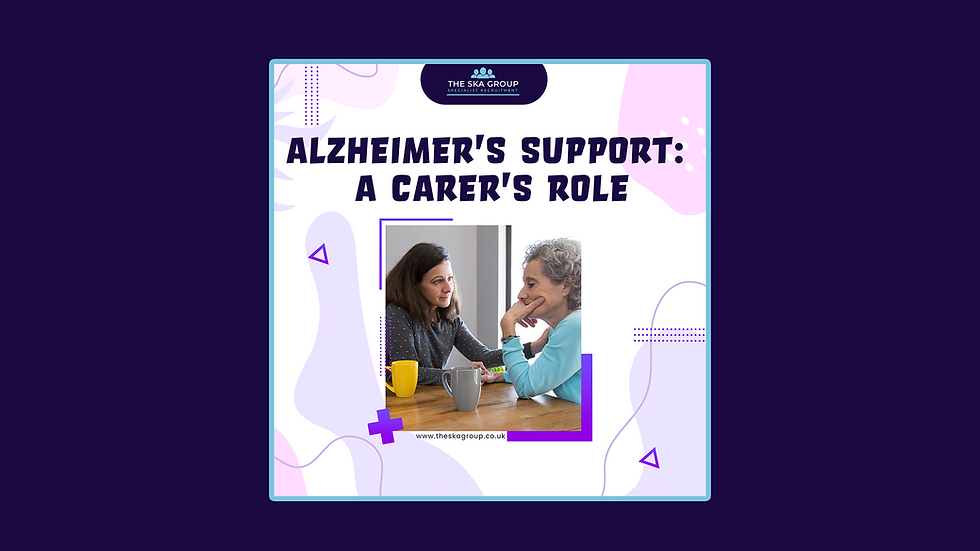Early Signs Of A Stroke
- Emily

- May 2, 2025
- 3 min read
What is a stroke?
A stroke happens when the blood supply to the brain gets interrupted. In most cases, this happens due to a blood clot or a blocked artery. Strokes can also occur if the blood vessel itself is damaged. Without a good enough blood supply, the brain cells don’t get the required amount of oxygen - if the supply is interrupted for long enough, the brain cells will die.
The after effects of a stroke depend on how long the interruption occurs for. A mini stroke, also called a transient ischemic attack (TIA), happens when a vessel is temporarily blocked. These symptoms can come and go within minutes as the blood supply returns, and as a result there might not be much permanent damage to the brain. However, a TIA can sometimes be a sign that a more serious stroke is on the way, so it’s important to take them seriously and seek help, even if symptoms clear up on their own.
A major stroke can cause very serious symptoms, including long term problems due to the damage of the brain cells. A stroke could even be fatal if you can’t get help quickly. The faster you get help, the better the chances of a good recovery.
Who is at risk?
Anyone can have a stroke, but some are more likely to have one than others. It’s important to know if you’re at a higher risk so that you can ensure you know the warning signs. You might not be aware if you have a weakened blood vessel, but other risk factors for stroke can be screened and oftentimes, changed.
Most strokes happen when there’s a blood clot or blockage in the vessels supplying the brain. Luckily, many of the factors that increase the risk of these blockages are under our control.
You are more likely to have a stroke if you:
Smoke
Drink a lot of alcohol
Have high cholesterol
Are overweight
Have high blood pressure
Have certain conditions such as diabetes
Getting regular exercise, eating a balanced diet and enjoying a healthy lifestyle can help lower many of these risk factors. If you want to find out your personal stroke risk, you can talk to a doctor to arrange a health screening.
How to spot the early signs
You might have heard of the FAST acronym before - it’s an easy way to remember the most common warning signs of a stroke and highlights the importance of acting quickly and effectively.
F - Face dropping (a smile will be one-sided or crooked)
A - Arm weakness and numbness (if you ask them to lift both arms, one will be lower than the other)
S - Speech problems (slurring or difficulty repeating themselves)
T - Time to call an ambulance
As well as remembering FAST, there are other possible symptoms that you should keep an eye out for too. These include:
A sudden, severe headache
Sudden dizziness
Loss of coordination
Loss of vision or sudden changes to vision in one or both eyes
Feeling confusion
Numbness or weakness in one side of the body
Signs of a stroke can appear suddenly, but there’s always time to act. If you take note of these symptoms and seek help even if they go away on their own, then your chances of a good recovery are much better. Don’t ignore warning signs, especially if there’s a chance you’ve had a TIA - get help right away as a more serious stroke could be coming.
Why it’s important
A stroke is a medical emergency and the faster you get treatment, the better. Call an ambulance right away if you suspect yourself or someone you care for is having a stroke.
The treatment given often varies depending on the type of stroke, the area of the brain affected and how severe the symptoms are. There are procedures that can help restore the blood flow, but sometimes surgeries are required.
Once the immediate threat has been nullified, you will likely need longer term treatment to prevent more strokes and help you recover well. Medication might be involved, or you might need extra support after treatment to manage any long term side effects such as mobility problems. The sooner you get help, the less likely you are to experience the long term effects of a stroke.
Now we’ve looked at the early warning signs of a stroke, do you feel better prepared to handle this kind of emergency?




Comments